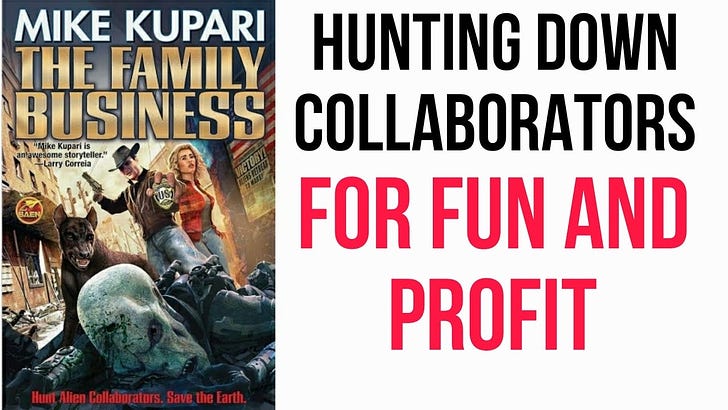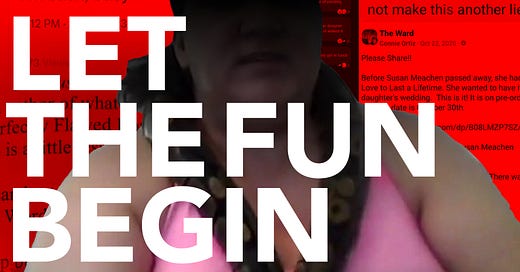
You can also follow my book reviews and commentary on YouTube.
What happens in an alien invasion story after humanity wins, and we're left to pick up the pieces of civilization? THE FAMILY BUSINESS puts us alongside a military veteran who makes his living hunting down pro-alien collaborators and bringing them to justice. When the Feds hire him to a particularly dangerous job, things will get...interesting.
The Story
You don't have to look very far to find a story about aliens invading Earth, and humankind uniting to pound them back into the cosmos. What made THE FAMILY BUSINESS cool was that it showed us the world a few years after the human victory, when our planet is trying to recover from population loss and damage to our infrastructure, to say nothing of our government or legal system.
It was also a fresh take on a bounty hunter story, where the focus is on bringing people in alive instead of constantly hunting dangerous fugitives. Our protagonist, Nathan Foster, has been at this for years and while he's a veteran of the war, he's not entirely jaded or downtrodden. He believes in the system and in what he's doing.
That makes him the right guy for the job when the Feds hire him to capture an escaped prisoner. He uses his wits and his contacts before he uses his guns.
I'll always have a soft spot for a good shoot-em-up sci-fi, and I kind of expected that from THE FAMILY BUSINESS, but this story wasn't afraid to show a little more creativity than that.
The Characters
Nathan Foster is our main guy. He was a tank commander in the war with the Visitors, and the other three guys in his unit all died. His business partner, Stella, is a hot secretary who's good at keeping his paperwork in line, cutting through the red tape that still exists even after an alien invasion. (Bureaucracy, man. It's the underwear rash of the civilized world.)
Rounding out Nathan's staff is his teen nephew Ben, who was orphaned during the war. He had a little bit of "Wesley Crusher" to him, in that he was a young kid that all the adults turned to with tech problems, but he wasn't annoying or anything. Just eager to learn and share his skills.
Then there's Emmogene Anderson, a former collaborator with the Visitors. They experimented on her but she doesn't know how because they wiped her memory; one such experiment left her with a device in her brain that can control other people. The other experiment, well...that's for you to discover, dear reader. It's pretty interesting.
Rounding out our principal cast is Swiss super-commando Anthony Krieg, a collaborator diehard and Emmogene's lover. Dude's got a few screws loose and he's not afraid to leave a body count behind him. He wants to retrieve Emmogene and get her help to bring the Visitors back to Earth. I kept seeing Dolph Lundgren in my head when I read this guy, even though he's Swedish. Kind of a paint-by-numbers 80s movie villain, though he has a unique motivation.
While there's a good handful of characters in this book, it's really the plot that moves things along. The first half is pretty linear--a few days here, a week there--and then there's a jump of several months about halfway through, which I was fine with because it kept things moving. The action scenes were swift yet the in-between stuff didn't drag, and I liked that it was easy to keep the pages turning. That's important in a sci-fi novel.
The World
In the not too-distant future, after humanity repelled an alien invasion. On their way out the door, the aliens dropped a few meteors on major cities around the world, leaving millions and millions of people dead.
Despite all of this, a lot of developed countries are almost back up and running, they just need help from independent contractors to perform certain tasks, at least until critical infrastructure is rebuilt.
Kupari's handling of a post-invasion Earth is utterly believable, especially since the government wasn't entirely destroyed. All of the government bureaucracy stuff feels very familiar and realistic--not even an alien war can really kill the administrative state.
There were the odd infodumps here and there, but in keeping with Kupari's pace throughout the book, they weren't overly long. Half a page here, maybe a whole page every once in a while, and they were easy to digest. I got the feeling he cared more about only putting in the relevant info, and not copy-and-pasting his worldbuilding notes into the text. It did slow down a little near the end, because it had to switch gears from a combat climax to a diplomatic closing. That said, I was still intrigued to the last page.
If I have any complaints, it's that there were certain parts of this fictional world we didn't get to see very much, namely the fauna. We're told that the Visitors brought some life-forms with them from their own ecosystems and introduced them to Earth, where they took over in some areas, but we only get one real scene with the humans going up against an alien animal. While more of these scenes could have slowed the story, it would have been cool to see some variety on that front.
Oh, and the cover--while very cool--was rather misleading. Nathan never hunts an actual alien. His focus is on the collaborators. You'll see when you read it. I think it sells the general concept decently enough, though.
The Politics
Since we see most of the story from Nathan's POV, we get plenty of "independent man can do, while bloated government cannot do" stuff. Other political considerations have to do with what the Visitors want and what mankind wants, and whether those two objectives can be reconciled without war.
Content Warning
Plenty of R-rated language and violence. Some talk of rape, and a little bit of consensual sexy-times, but not in excessive detail.
Who is it for?
I could see an audience consisting of military fiction readers, sci-fi fans, and people who like bounty hunter stories. It's a little bit western, but not too cowboy. It's set mostly in Arizona, New Mexico, and Utah.
Why read it?
I was most impressed by how real it felt, and for an alien invasion story, that's saying something. This is my third foray into Kupari's writing and his military experience always comes through strong in his books. He's walked in the main character's footsteps and he knows how to include the details that take you down the same path. It wasn't just the plot and the worldbuilding that gave this book a unique flavor.




![The Family Business by [Mike Kupari] The Family Business by [Mike Kupari]](https://substackcdn.com/image/fetch/w_1456,c_limit,f_auto,q_auto:good,fl_progressive:steep/https%3A%2F%2Fbucketeer-e05bbc84-baa3-437e-9518-adb32be77984.s3.amazonaws.com%2Fpublic%2Fimages%2Ff8b317fe-4e44-418c-a8aa-c63e6001cf63_329x500.jpeg)








